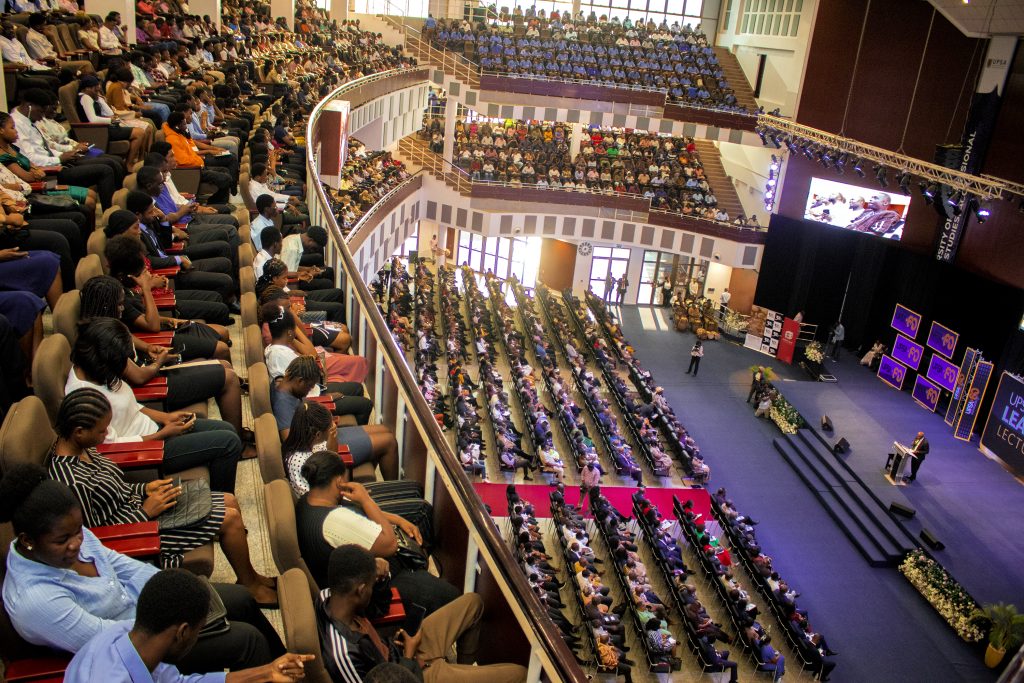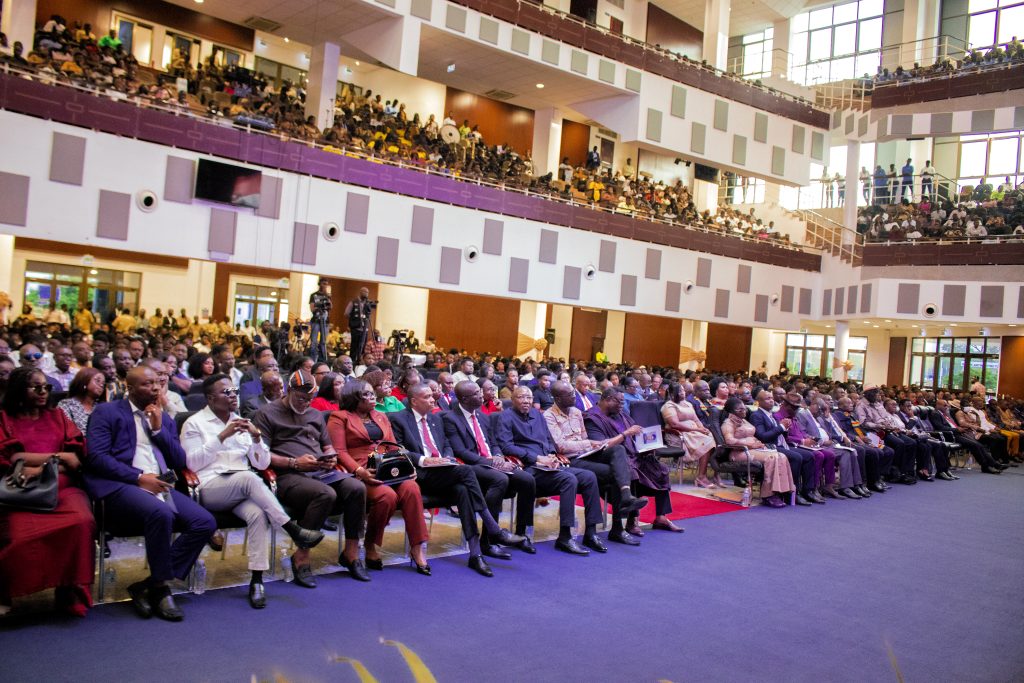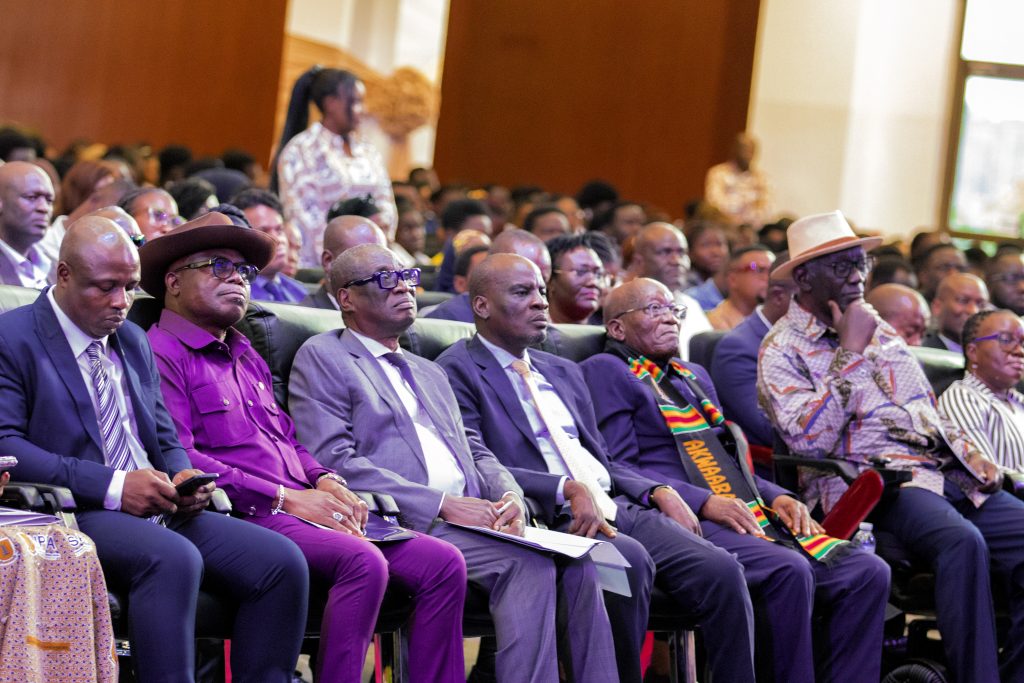This Content Is Only For Subscribers
When African nations lowered the colonial flags and raised their own, they declared political independence. Yet, decades later, many leaders and thinkers still argue that true freedom has remained elusive. The continent’s economies, tethered to external currencies and financial systems, continue to dance to rhythms set in Washington, Brussels, and other distant capitals.
“We are free in flag and anthem, but our currencies are hostages,” thundered at the recent UPSA Annual Leadership Lecture, capturing a sentiment long felt across the African continent. “Why are we allowing the Americans to dominate with the dollar… if it’s agreed, let us then have our own.” said Jacob Zuma (former South African President).
These words strike at the heart of one of the most consequential debates of our time — the geopolitics and geo-economics of de-dollarisation. For Africa, the lessons from the BRICS strategy may be vital as the continent contemplates its own ambitious goal: a common African currency.



We are free in flag and anthem, but our currencies are hostages.
The dollar’s dominance as political power
The dollar’s status as the global reserve currency is not merely an economic fact. It is a geopolitical lever. It grants the United States unparalleled influence over global trade, finance, and even the sovereignty of other nations. Sanctions, financial restrictions, and the dominance of dollar-based payment systems illustrate how the greenback functions as an instrument of power, not just a unit of exchange.
As Zuma pointed out in his lecture, this dominance comes at Africa’s expense. The continent exports its resources, often priced in dollars, but imports inflation, volatility, and policy shocks tied to decisions made far from African shores. “The dollar is not neutral. It is a political tool used against the African people,” underscoring the urgency of a paradigm shift.
BRICS and the strategy of resistance
In recent years, the BRICS bloc — Brazil, Russia, India, China, and South Africa — has emerged as a laboratory for alternatives. For Zuma and his contemporaries, BRICS represents more than a diplomatic alliance; it is a blueprint for financial emancipation.
The creation of the New Development Bank (NDB) was one such milestone. Unlike traditional Western-dominated financial institutions, the NDB positions itself as a lender attuned to the priorities of emerging economies. But beyond finance, BRICS has gone further: envisioning a payments architecture outside the dollar system and even exploring the possibility of a shared currency unit.
“BRICS gives us the courage to say that another world is possible. It shows that we do not have to accept dollar domination as inevitable,” Zuma reminded his audience.
The experiments are still early, but the political symbolism is powerful. If BRICS can demonstrate that trade and finance are viable outside the dollar’s shadow, it could embolden regions like Africa to pursue similar paths.
The promise and peril of de-dollarisation
De-dollarisation is not a slogan; it is a process. It requires infrastructure, trust, and discipline. BRICS nations have built mechanisms to trade in local currencies, launched a development bank, and even piloted digital currency innovations. For Africa, these examples offer both inspiration and caution.
The promise is clear: reduced vulnerability to dollar volatility, greater control over monetary policy, and the symbolic restoration of sovereignty. The peril is equally real: fragmented implementation, political rivalries, and the ever-present risk that replacing one dependency might only create another.
“We must not allow ourselves to exchange one master for another. If we move away from the dollar, it must be toward genuine African control, not merely dependence on another power,”.
If Africa cannot govern its currencies collectively, it cannot govern its destiny.
Lessons for Africa’s common currency
The idea of a common African currency is not new. The dream of monetary union has long been embedded in the vision of pan-Africanists, from Kwame Nkrumah to the architects of the African Union’s Agenda 2063. The speeches under review bring this vision back to the centre of debate, emphasizing lessons Africa can draw from BRICS.
Political unity is non-negotiable
A currency is more than paper and coin; it is an expression of shared sovereignty. Without strong political institutions and trust, a common currency risks collapse under the weight of divergent interests. “If Africa cannot govern its currencies collectively, it cannot govern its destiny,” Zuma cautioned.
Trade must lead the way
Common currencies thrive where trade flows are strong and diversified. Intra-African trade, while growing under the African Continental Free Trade Area (AfCFTA), still lags behind other regions. A strong African currency must be anchored in robust intra-continental trade, not merely resource exports priced abroad.
We must be honest: without discipline and unity, our dream of monetary independence will collapse into another empty slogan.
Build institutions before symbols
The lecture repeatedly emphasized that Africa must construct the institutional scaffolding — payment systems, central banking mechanisms, reserve pools — before launching a shared currency. “We cannot jump into a common currency as a political gesture. We must build it as a functional reality.”
The unfinished business of liberation
Accordingly, the de-dollarisation is a continuation of Africa’s liberation struggle. Political flags may have been hoisted in the 1960s, but economic sovereignty remains incomplete.
“Political liberation was achieved, yes, but economic liberation remains unfinished business,” said Zumah. This unfinished business is precisely what motivates the call for a new monetary architecture.
For many, the reliance on foreign currencies is a form of neo-colonialism — a structural dependence that ensures Africa remains a price-taker, not a price-setter, in the global economy. BRICS, in this sense, becomes a classroom where Africa can study alternatives and craft its own.
Risks, realities, and roadblocks
Despite the passionate calls, the road to an African common currency is paved with obstacles. Divergent fiscal policies, unequal economic structures, and persistent governance challenges have stalled regional projects such as ECOWAS’s “eco” currency.
Moreover, the politics of sovereignty can work against integration. Nations may be reluctant to cede monetary control to supranational bodies, even if they agree in principle. And external pressures from markets, creditors, and geopolitical powers will continue to weigh heavily on African governments.
As Zuma warned, “We must be honest: without discipline and unity, our dream of monetary independence will collapse into another empty slogan.”
Beyond Africa: the global ripple effects
The conversation about de-dollarization is not confined to BRICS or Africa. Across the globe, nations are exploring alternatives, from digital currencies to bilateral trade in local units. The dollar remains dominant, but its share of global reserves is slowly declining, and confidence in its neutrality is waning.
For Africa, this is both a risk and an opportunity. If the continent moves too slowly, it may once again find itself adjusting to systems built elsewhere. If it acts decisively, it could shape its own future.
Way forward: from rhetoric to architecture
So, what should Africa do? the lecture provided the following roadmap:
- Scale up regional payment systems such as the Pan-African Payment and Settlement System (PAPSS) to reduce transaction costs and dependence on external currencies.
- Develop pooled reserves and local currency swap lines to cushion shocks.
- Strengthen trade integration under AfCFTA, ensuring that African currencies have real economic flows to anchor them.
- Invest in digital financial infrastructure, learning from BRICS experiments, to leapfrog traditional bottlenecks.
- Embed transparency and governance safeguards, so that de-dollarisation does not merely hand control from Washington to Beijing or any other capital.
In short, Africa must build before it proclaims.
The choice before Africa
The geopolitics of de-dollarisation is more than a technical matter; it is a question of sovereignty, dignity, and destiny. BRICS is showing that alternatives are possible, even if incomplete. Africa, with its youthful population, abundant resources, and deepening integration, has the potential to chart its own course.
But as a reminder, the task will demand discipline, courage, and unity. The common currency must not remain a utopian dream, nor should it become a rushed political stunt. It must be built brick by brick, institution by institution, until Africa can finally claim not just political freedom, but economic independence.
“If we move away from the dollar, it must be toward genuine African control,” That is the challenge. And it is also the promise.


